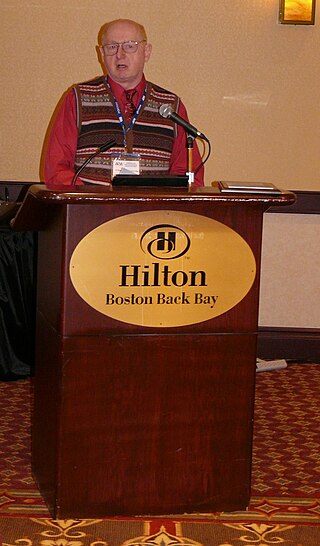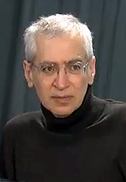Social simulation is a research field that applies computational methods to study issues in the social sciences. The issues explored include problems in computational law, psychology, organizational behavior, sociology, political science, economics, anthropology, geography, engineering, archaeology and linguistics.

A multi-agent system is a computerized system composed of multiple interacting intelligent agents. Multi-agent systems can solve problems that are difficult or impossible for an individual agent or a monolithic system to solve. Intelligence may include methodic, functional, procedural approaches, algorithmic search or reinforcement learning.

In sociology, social complexity is a conceptual framework used in the analysis of society. In the sciences, contemporary definitions of complexity are found in systems theory, wherein the phenomenon being studied has many parts and many possible arrangements of the parts; simultaneously, what is complex and what is simple are relative and change in time.

Computational sociology is a branch of sociology that uses computationally intensive methods to analyze and model social phenomena. Using computer simulations, artificial intelligence, complex statistical methods, and analytic approaches like social network analysis, computational sociology develops and tests theories of complex social processes through bottom-up modeling of social interactions.
An agent-based model (ABM) is a computational model for simulating the actions and interactions of autonomous agents in order to understand the behavior of a system and what governs its outcomes. It combines elements of game theory, complex systems, emergence, computational sociology, multi-agent systems, and evolutionary programming. Monte Carlo methods are used to understand the stochasticity of these models. Particularly within ecology, ABMs are also called individual-based models (IBMs). A review of recent literature on individual-based models, agent-based models, and multiagent systems shows that ABMs are used in many scientific domains including biology, ecology and social science. Agent-based modeling is related to, but distinct from, the concept of multi-agent systems or multi-agent simulation in that the goal of ABM is to search for explanatory insight into the collective behavior of agents obeying simple rules, typically in natural systems, rather than in designing agents or solving specific practical or engineering problems.
An artificial society is an agent-based computational model for computer simulation in social analysis. It is mostly connected to the themes of complex systems, emergence, the Monte Carlo method, computational sociology, multi-agent systems, and evolutionary programming. While the concept was simple, actually realizing this conceptual point took a while. Complex mathematical models have been, and are, common; deceivingly simple models only have their roots in the late forties, and took the advent of the microcomputer to really get up to speed.

Sociology as a scholarly discipline emerged, primarily out of Enlightenment thought, as a positivist science of society shortly after the French Revolution. Its genesis owed to various key movements in the philosophy of science and the philosophy of knowledge, arising in reaction to such issues as modernity, capitalism, urbanization, rationalization, secularization, colonization and imperialism.

Mathematical sociology or the sociology of mathematics is an interdisciplinary field of research concerned both with the use of mathematics within sociological research as well as research into the relationships that exist between maths and society.

Douglas R. White was an American complexity researcher, social anthropologist, sociologist, and social network researcher at the University of California, Irvine.

William Sims Bainbridge is an American sociologist who currently resides in Virginia. He is co-director of Cyber-Human Systems at the National Science Foundation (NSF). He is the first Senior Fellow to be appointed by the Institute for Ethics and Emerging Technologies. Bainbridge is most well known for his work on the sociology of religion. Recently he has published work studying the sociology of video gaming.
William Anthony Gamson was a professor of Sociology at Boston College, where he was also the co-director of the Media Research and Action Project (MRAP). He is the author of numerous books and articles on political discourse, the mass-media and social movements from as early as the 1960s. His influential works include Power and Discontent (1968), The Strategy of Social Protest (1975), Encounters with Unjust Authority (1982) and Talking Politics (2002), as well as numerous editions of SIMSOC.

Nikolas Rose is a British sociologist and social theorist. He is Distinguished Honorary Professor at the Research School of Social Sciences, in the College of Arts and Social Sciences at the Australian National University and Honorary Professor at the Institute of Advanced Studies at University College London. From January 2012 to until his retirement in April 2021 he was Professor of Sociology in the Department of Global Health and Social Medicine at King's College London, having joined King's to found this new Department. He was the Co-Founder and Co-Director of King's ESRC Centre for Society and Mental Health. Before moving to King's College London, he was the James Martin White Professor of Sociology at the London School of Economics, director and founder of LSE's BIOS Centre for the Study of Bioscience, Biomedicine, Biotechnology and Society from 2002 to 2011, and Head of the LSE Department of Sociology (2002–2006). He was previously Professor of Sociology at Goldsmiths, University of London, where he was Head of the Department of Sociology, Pro-Warden for Research and Head of the Goldsmiths Centre for Urban and Community Research and Director of a major evaluation of urban regeneration in South East London. He is a Fellow of the British Academy, the Royal Society of Arts and the Academy of Social Sciences, and a Fellow of the Royal Danish Academy of Science and Letters. He holds honorary doctorates from the University of Sussex, England, and Aarhus University, Denmark.

Sociology is a social science that focuses on society, human social behavior, patterns of social relationships, social interaction, and aspects of culture associated with everyday life. It uses various methods of empirical investigation and critical analysis to develop a body of knowledge about social order and social change. While some sociologists conduct research that may be applied directly to social policy and welfare, others focus primarily on refining the theoretical understanding of social processes and phenomenological method. Subject matter can range from micro-level analyses of society to macro-level analyses.
Agent-based social simulation consists of social simulations that are based on agent-based modeling, and implemented using artificial agent technologies. Agent-based social simulation is a scientific discipline concerned with simulation of social phenomena, using computer-based multiagent models. In these simulations, persons or group of persons are represented by agents. MABSS is a combination of social science, multiagent simulation and computer simulation.

Geoffrey Nigel Gilbert is a British sociologist and a pioneer in the use of agent-based models in the social sciences. He is the founder and director of the Centre for Research in Social Simulation, author of several books on computational social science, social simulation and social research and past editor of the Journal of Artificial Societies and Social Simulation (JASSS), the leading journal in the field.

Alan N. Shapiro is an American science fiction and media theorist. He is a lecturer and essayist in the fields of science fiction studies, media theory, posthumanism, French philosophy, creative coding, technological art, sociology of culture, social choreography, software theory, robotics, artificial intelligence, and futuristic and transdisciplinary design. Shapiro's book and other published writings on Star Trek have contributed to a change in public perception about the importance of Star Trek for contemporary culture. His published essays on Jean Baudrillard - especially in the International Journal of Baudrillard Studies - have contributed to a change in public perception about the importance of Baudrillard's work for culture, philosophy, sociology, and design.
Rosaria Conte was an Italian social scientist. She was the head of the Laboratory of Agent Based Social Simulation at the ISTC-CNR in Rome, which hosts an interdisciplinary research group working at the intersection among cognitive, social and computational sciences. She was President of European Social Simulation Association and AISC. Rosaria Conte published more than 130 works among volumes, papers in scientific journals, conference proceedings and book chapters. Her scientific activity aims at explaining social behaviour among intelligent autonomous systems, and modeling the dynamics of norms and norm-enforcement mechanisms. Her research was characterized by a highly interdisciplinary approach, at the intersection among cognitive, social and computational sciences. In her name, the European Social Simulation Association assigns every other year the Outstanding Contribution Award for Social Simulation, whose first recipients are Nigel Gilbert and Uri Wilensky.
Klaus G. Troitzsch is a German sociologist. He became famous for introducing the method of computer-based simulation in the social sciences. He was professor and director of the Institute for IS Research at University of Koblenz-Landau.
Historical dynamics broadly includes the scientific modeling of history. This might also be termed computer modeling of history, historical simulation, or simulation of history - allowing for an extensive range of techniques in simulation and estimation. Historical dynamics does not exist as a separate science, but there are individual efforts such as long range planning, population modeling, economic forecasting, demographics, global modeling, country modeling, regional planning, urban planning and many others in the general categories of computer modeling, planning, forecasting, and simulations.








